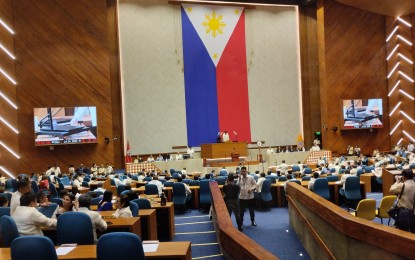
(PNA file photo)
MANILA – The House of Representatives on Wednesday approved on second reading a new procurement legislation to make the process more cost-effective, transparent, competitive, streamlined, and sustainable.
During the plenary session, the House passed through voice voting, House Bill (HB) 9663, otherwise known as the proposed New Government Procurement Reform Act.
During his second State of the Nation Address (SONA) in July, President Ferdinand R. Marcos Jr. said enacting a new government procurement law would strengthen the whole-of-government and whole-of-society approach, which is regarded as a "transformative" solution amid the changing times.
The bill seeks to institute a streamlined and transparent procurement process through definitive periods in the process, the use of emerging technologies and innovative solutions, and open contracting practice.
Under the bill, an electronic procurement system shall be adopted, which provides for a single portal through the Philippine Government Electronic Procurement System (PhilGEPS), as the primary source of information on all government procurement activities, from the planning stage up to contract implementation.
Manila 4th District Rep. Edward Maceda said the bill would give high reliability on emerging technologies and innovative solutions by mandating the systems integration between and among key government agencies, as well as using platforms in the information distribution, accessibility of information, and public awareness to support digitalization and innovation.
He said the measure seeks to strengthen the strategic planning stage of the procurement by applying such strategies as fit-for-purpose policy, detailed engineering, multiyear contracting, early procurement activities, framework agreement, engagement of procuring agent, mandatory market scoping, and the use of life cycle assessment and life cycle cost analysis.
He said one of the bill's salient features is the best value procurement, which sets the criteria of quality-price ratio in using the most economically advantageous bid (MEAB) for goods and infrastructure projects. Criteria include qualitative, environmental, social, and/or aspects linked to the subject matter of the procuring entity.
"The heart of this bill, and without this feature, there can be no revision of the procurement law, is the provision giving the Bids and Awards Committee (BAC) or the head of procuring entity (HoPE) the option to use the most economically advantageous bid in evaluating bids for goods and infrastructure projects," he said.
Aside from competitive procurement, other alternative modes of procurement proposed in the measure are direct contracting, limited source bidding, repeat order, and negotiation.
For sustainable procurement, HB 9663 promotes green public procurement and the inclusion of marginal sectors in the procurement. (PNA)
